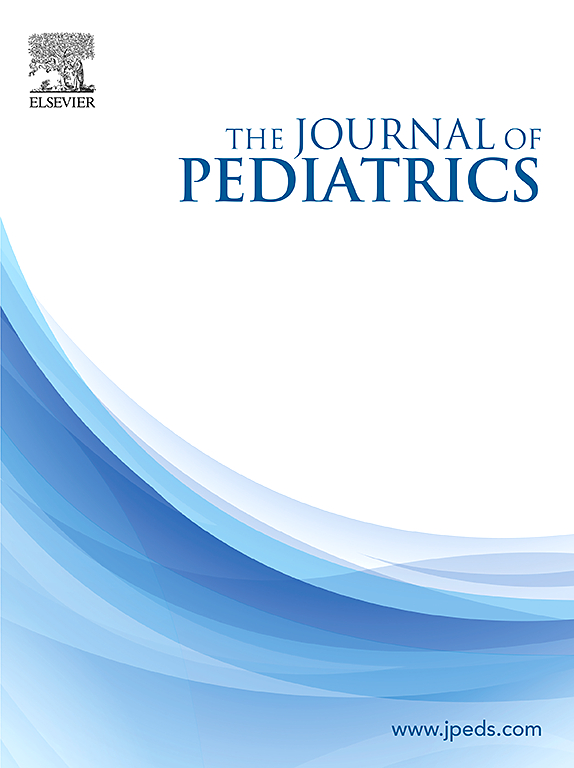Association of Allergy Specialty Care and Asthma Outcomes for Medicaid-Enrolled Children
IF 3.5
2区 医学
Q1 PEDIATRICS
引用次数: 0
Abstract
Objective
To evaluate the comparative effectiveness of allergy specialist care for children with asthma enrolled in the Arkansas Medicaid program.
Study design
We used the Arkansas All-Payers Claims Database to identify Medicaid-enrolled children with asthma who had an allergy specialist visit in 2018. These children were propensity score matched to children without an allergy specialist visit to evaluate differences in asthma-related adverse events (AAEs), specifically emergency department visits and/or hospitalizations in 2019. Multivariable logistic regression was used to assess the association between allergy specialist care in 2018 and AAEs in 2019.
Results
Prior to matching, a higher percentage of children with an allergy specialist visit had persistent asthma, were atopic, and received influenza vaccination. In the matched sample, 10.1% of identified patients experienced an AAE in 2019. Adjusted analysis showed 21.0% lower odds of AAEs (aOR: 0.79; 95% CI: 0.63, 0.98) in 2019 for children with an allergy specialist visit (n = 2964) in 2018 compared with those without an allergy specialist visit (ME: 9.1% vs 11.0%; P = .04).
Conclusions
Children with asthma enrolled in Arkansas Medicaid who saw an allergy specialist were less likely to have an AAE. Asthma quality metrics developed using guideline-based recommendations for allergy specialist care should be considered for asthma health management programs.
过敏专科护理与参加医疗补助计划儿童的哮喘治疗效果之间的关系。
目的:评估阿肯色州医疗补助计划中的哮喘患儿接受过敏专科护理的比较效果:评估阿肯色州医疗补助计划中的哮喘患儿接受过敏专科护理的比较效果:我们使用阿肯色州所有支付者索赔数据库(APCD)来识别2018年接受过过敏专科就诊的哮喘病医保参保儿童。将这些儿童与未接受过敏专科就诊的儿童进行倾向评分匹配,以评估2019年哮喘相关不良事件(AAE)的差异,特别是急诊就诊和/或住院治疗。多变量逻辑回归用于评估 2018 年过敏专科就诊与 2019 年 AAE 之间的关联:在匹配之前,接受过过敏专科就诊的儿童中,患有持续性哮喘、特应性疾病和接种过流感疫苗的比例较高。在匹配样本中,10.1% 的已识别患者在 2019 年经历了 AAE。调整后的分析表明,与没有过敏专科医生就诊的儿童相比(ME:9.1% vs 11.0%;P=0.04),2018 年有过敏专科医生就诊的儿童(n=2964)在 2019 年发生 AAE 的几率降低了 21.0%(aOR:0.79;95%CI:0.63,0.98):参加阿肯色州医疗补助计划的哮喘儿童中,接受过敏专科医生诊治的儿童发生 AAE 的可能性较低。哮喘健康管理计划应考虑使用基于指南的过敏专科护理建议制定哮喘质量指标。
本文章由计算机程序翻译,如有差异,请以英文原文为准。
求助全文
约1分钟内获得全文
求助全文
来源期刊

Journal of Pediatrics
医学-小儿科
CiteScore
6.00
自引率
2.00%
发文量
696
审稿时长
31 days
期刊介绍:
The Journal of Pediatrics is an international peer-reviewed journal that advances pediatric research and serves as a practical guide for pediatricians who manage health and diagnose and treat disorders in infants, children, and adolescents. The Journal publishes original work based on standards of excellence and expert review. The Journal seeks to publish high quality original articles that are immediately applicable to practice (basic science, translational research, evidence-based medicine), brief clinical and laboratory case reports, medical progress, expert commentary, grand rounds, insightful editorials, “classic” physical examinations, and novel insights into clinical and academic pediatric medicine related to every aspect of child health. Published monthly since 1932, The Journal of Pediatrics continues to promote the latest developments in pediatric medicine, child health, policy, and advocacy.
Topics covered in The Journal of Pediatrics include, but are not limited to:
General Pediatrics
Pediatric Subspecialties
Adolescent Medicine
Allergy and Immunology
Cardiology
Critical Care Medicine
Developmental-Behavioral Medicine
Endocrinology
Gastroenterology
Hematology-Oncology
Infectious Diseases
Neonatal-Perinatal Medicine
Nephrology
Neurology
Emergency Medicine
Pulmonology
Rheumatology
Genetics
Ethics
Health Service Research
Pediatric Hospitalist Medicine.
 求助内容:
求助内容: 应助结果提醒方式:
应助结果提醒方式:


